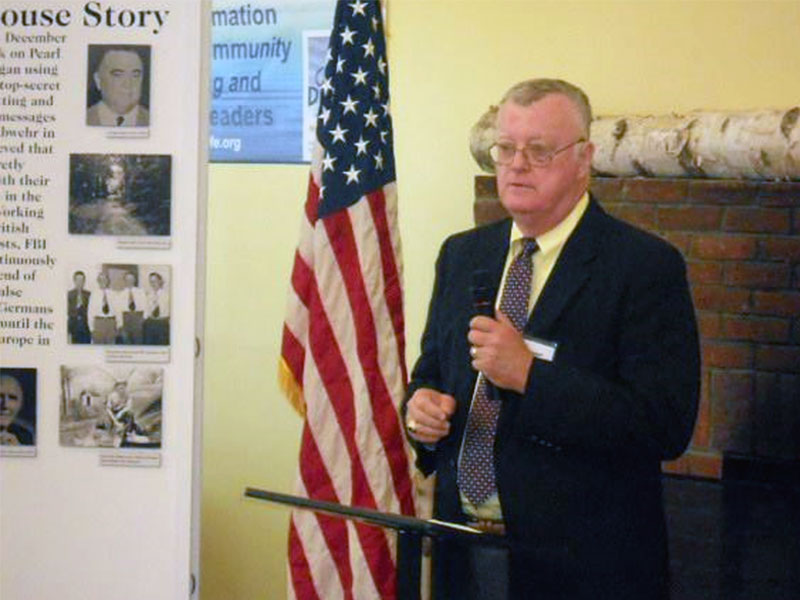
June 7, 2014 7:14 PM
By
Vicki Jean Johnson’s parents never told her they came to Wading River to help fight the Nazis.
The retired middle-school teacher knew her father, Donworth Drew Johnson, had been on the trail of America’s most wanted during his dozen years in the FBI.

But it was a phone call earlier this year that revealed to her that her home of three years overlooking Long Island Sound had been a secret U.S. espionage post that sent false information to Germany about the impending D-Day invasion and other military matters.
“He taught me to be truthful, and he was lying back and forth to the Germans,” Johnson said with a chuckle. “He must have been good at it, but it was for a good reason.”
One day after the 70th anniversary of the Normandy invasion, Johnson, who now lives in Selma, Texas, joined about 100 people yesterday in honoring the wartime role of Benson House. A plaque was erected by the FBI’s Society of Former Special Agents.
The house, now part of the Episcopal diocese’s Camp DeWolfe, was home to FBI agents and radio technicians who, posing as German spies, broadcast false intelligence to Germany from January 1942 to June 1945.
Raymond Batvinis, chairman of the society’s historical committee and author of the book “Hoover’s Secret War Against Axis Spies,” tracked down Johnson. Over the phone, he revealed what her father really did during the war.
“She was never told much,” Batvinis said. “Her father went to his grave with his secret on his lips.”
Johnson, 73, has no recollection of the house but photos of her as a toddler in the house with her mother hung on its walls yesterday. She said she was “proud, absolutely,” of her father’s spy work. He died in 1999.
Kathryn Curran, director of the Suffolk County Historical Society, which helped organize the event, said it shows how Wading River contributed to “the history of the world.”
Dave Nadel, 92, of East Meadow, an Army communications technician during D-Day, said he knew nothing of the Benson House operation during the war.
“They did a good job in hiding this,” he said at the ceremony. “Everyone played a little piece, and nobody knew what everyone else was doing.”
Declassified FBI documents related to Benson House (.pdf)

From River Head News-Review:
Spy house in Wading River helped trick Nazis before D-Day
by Paul Squire, 8 June 2014
Midway through her speech at the Benson House in Wading River, Suffolk County Historical Society director Kathy Curran became overwhelmed with emotion.
She stopped reading her prepared statements, and looked at the four elderly World War II veterans sitting in the front row, one of whom stormed the beaches at Normandy 70 years ago.
“I’m just so moved,” she said. “To be in the presence of these heroes … it’s just so important that this be recognized, that your service be honored.”
Ms. Curran, along with local politicians, Federal Bureau of Investigations agents and historians spoke Saturday morning at the commemoration of the Wading River building’s role as a secret FBI counterintelligence base and praised the efforts of those in the house and Long Island’s veterans.
From 1942 to 1945, the FBI used the house to send radio communications to spymasters in Japan and Nazi Germany, tricking them with a mix of the harmless truth and outright lies.
Their efforts, in part, shaped the war.
In April 1942, the house — which the Germans believed was one of their spies — received a message that indicated the Nazis were interested in researching an atomic bomb. That information, in part, led President Franklin Roosevelt to accelerate the United State’s own development of the weapon, said Ellen Glasser, president of the Society of Former Special Agents of the FBI.
The house also fed falsified info to German military leadership about the D-Day invasion in 1944, helping to mislead the German forces into sending their forces to the wrong beaches.
You must be logged in to post a comment.